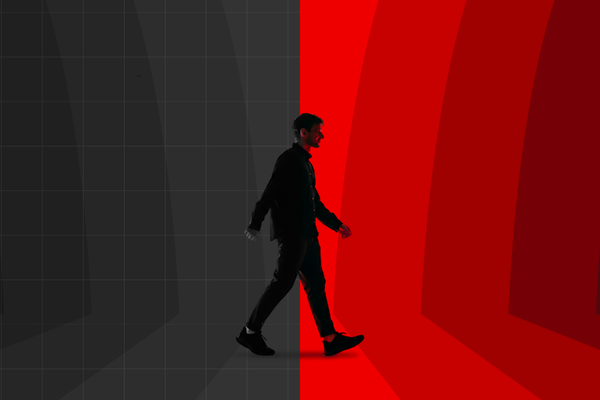Cultivating creative and analytical thinking

Mark Joseph at Vouch Global argues that analysts can be creative, and creative thinkers can be analytical: leaders should cultivate both ways of thinking within their teams
It’s broadly accepted that you’re either a creative or an analytical thinker; that the two forms are mutually exclusive and it’s too much for businesses to expect both from their employees.
But why should this balance be unachievable? Why shouldn’t your creatives be able to take an analytical approach when the need arises? Or your analytical thinkers be able to think not only outside the box, but under it, on top of it, or in another box altogether?
There’s no reason why art and science can’t meet or overlap and businesses trapped within the singular mindset are leaving their employee’s potential untapped.
Creative and analytical thinking are not mutually exclusive
There is no denying that most people identify more strongly with either the sciences or the arts. While you might have an appreciation of both, in your career you’ll take one path or the other and you’ll fit your character into the expectations of the role.
The ‘serious’, analytical type. Or the more ‘frivolous’ creative. The stereotypes are there and it’s easy to fill them, even though the reality may vary hugely.
However, once you’re in your role, you’ll rarely be asked to step out of it. Creatives won’t be asked to assess what went wrong within a campaign. The analytics department won’t be invited to discuss the visuals or the messaging. They will each work within their boxed-off niche, feeding back to supervisor level.
This is the status quo partly because it generally works. Everyone knows what’s expected of them, and no one is moved outside of their comfort zone.
But contemporary business is all about adaptability. When you bring the two disciplines together you create a more cohesive working environment, one where each part of the team has an appreciation of the other’s strengths and has the potential to make valid contributions to the whole project execution. You also create a workforce that has the confidence to meet every challenge it faces.
So, how does this work?
The benefits of balanced thinking
We need experts in every field. If someone’s role is within the analytical sphere, they need to have the ability to go deep into analytics. Creatives will, likewise, always lead the charge in the creative field.
However, having a broad understanding of the other sector, and being aware of how your work dovetails with other departments, can enhance individual productivity and business performance.
Take our data analyst, at Vouch, for example. He digs deep into first-party, third-party, quantitative and qualitative social demographic data, daily. He helps creatives interpret data. But he also helps them decide how that data could then be used to inform a creative campaign. Whilst that’s not his primary role, our effectiveness as a team would be minimised without harnessing his deep knowledge of the data and his insight.
Uniting both sides of the brain
Before you can make real changes to working practices, you first need to know what you’re working with.
There is a range of tools available to help with this. The CliftonStrengths assessment and the Stroop Test, for example, can both be used to help identify individual employees’ strengths, whether creative or analytical. This data can then be used in a range of ways.
Rather than focusing on shortcomings, discuss this data with the whole team and with the individuals. Discussing it with the team helps everyone to understand who brings what to the table and how we can lean on each other, make the most of each other’s strengths, and support each other most effectively. And working on an individual level allows each person to use the information to identify areas of potential improvement.
While there can be resistance to acquiring new skills, or opening up to the understanding of other departments, this method of working more often than not reveals unexpected strengths. You’ll find that members of your creative team who initially believe they are not analytical, will have analytical tendencies outside of their creative work; and vice versa for the non-creatives.
By encouraging your team members to examine the areas they consider to be outside their skillset, you are removing personal, self-limiting barriers. This not only has the potential to enhance the performance of your business but also to help individual workers feel more fulfilled in their roles at work and develop a greater appreciation of their own potential.
Throughout our lives, we’re told that we’re creative or we’re logical. We’re right-brained or left-brained. We can’t ever be both and because it is drummed into us from an early age, we never challenge that concept.
Because of this, if we’re drawn to creativity, we never seek to enlarge our analytical abilities. If we’re better with figures and verifiable facts, we don’t think about how we could use those skills creatively. We accept our limitations.
But if we unbox our subconscious and remove the barriers that we place in front of us, there’s no reason why we can’t become more balanced thinkers. With preferences one way or the other, but adaptable and confident that when the need arises, we will be able to tackle anything that comes our way.
Mark Joseph is the founder of Vouch Global, a creative performance agency dedicated to helping clients gain real influence through insight and strategy-driven content creation.
Main image courtesy of iStockPhoto.com

Business Reporter Team
Related Articles
Most Viewed
Winston House, 3rd Floor, Units 306-309, 2-4 Dollis Park, London, N3 1HF
23-29 Hendon Lane, London, N3 1RT
020 8349 4363
© 2025, Lyonsdown Limited. Business Reporter® is a registered trademark of Lyonsdown Ltd. VAT registration number: 830519543





